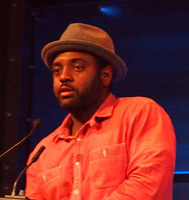Ex-con and Yale Law grad must prove 'good moral character' before being able to practice

Reginald Betts/Slowking4 (Wikimedia Commons)
A former convict who has graduated from Yale Law School and is an acclaimed author and poet now must prove his “good moral character” to Connecticut officials before he can practice law, The Associated Press reports.
Reginald Dwayne Betts, 36, passed the state bar exam in February but now must, by “clear and convincing evidence,” prove his rehabilitation to a panel of judges on the Connecticut Bar Examining Committee, which is investigating his background and will hold a hearing.
When he was 16, Betts lived in Suitland, Maryland, southeast of Washington D.C. On an impulse, he was involved in an armed robbery and carjacking at a northern Virginia shopping mall. He was convicted of three felonies and served eight years in prison.
Betts had been an honor student and intended to go to college, though he grew up surrounded by drugs, violence and pathways to prison, PBS reported in a feature in 2016.
Betts will receive support in his effort to be admitted to the bar by people from many walks of life, says his lawyer, William Dow III.
“It’s an honor representing this man,” Dow told the AP. “He has a resume that is absolutely breathtaking. He personifies what people talk about when they speak of second chances.”
After prison, Betts got a college education and taught school in the nation’s capital, basing some of his poetry on experiences with youngsters near the tough streets, according to the PBS feature. He went on to Yale Law School.
Over the years, Betts has written two books of poetry and a book titled A Question of Freedom: A Memoir of Learning, Survival, and Coming of Age in Prison, which won a 2010 NAACP Image award.
Betts, who is married with two children, has been working in the state public defender’s office in New Haven.
Though not discussing Betts’ case, bar examining committee chairwoman and former judge Anne Dranginis said the panel has allowed admittance to practice law to felons, but that it is rare.
“It is not an automatic disqualifier,” Dranginis says. “There are many times where we see things that happen early in a person’s life that cease to be problems for them. What we do see is … people take responsibility for their past conduct and very often have been rehabilitated.
Felons are banned from becoming lawyers in Kansas, Mississippi and Texas. Many states have character requirements such as those in Connecticut.



